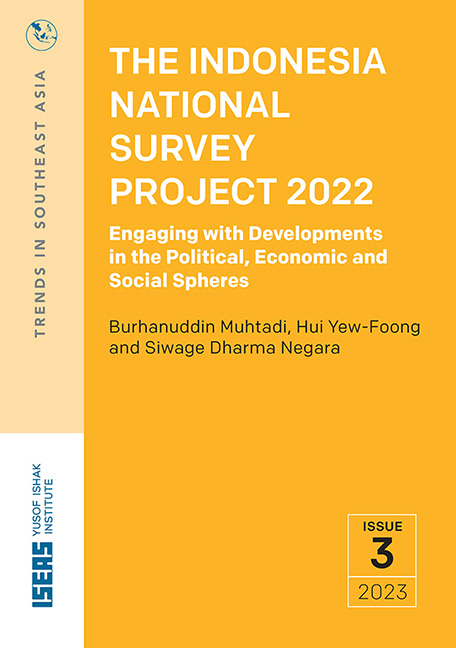 The Indonesia National Survey Project 2022
The Indonesia National Survey Project 2022 Published online by Cambridge University Press: 09 January 2024
Approval Rating of President Joko Widodo
Around 71.8 per cent of respondents are quite or very satisfied with the performance of President Jokowi, which is slightly higher than the 68 per cent that was recorded for the INSP2017. This is despite many criticisms about authoritarian tendencies and democratic regression under Jokowi. The majority across almost every socio-demographic group and region are quite or very satisfied with Jokowi, except for the Minangkabau ethnic group (Figure 1). Notably, Jokowi’s approval rating among non-Muslim respondents is very high at 91.6 per cent, which indicates his ability to unite non-Muslims as a voting bloc. Unsurprisingly, the majority of those who voted for the Prosperous Justice Party (PKS), a conservative Islamic party, and the Prabowo-Sandiaga pair in the 2019 parliamentary and presidential elections respectively, disapprove of Jokowi’s performance (Figure 2).
Trust in Institutions
Respondents are asked how much they trust different institutions in Indonesia. Their answers show that the Armed Forces (TNI) remains the most trusted (89.6 per cent), followed by Provincial Governments (83.1 per cent), District/City Governments (81 per cent), the Central Government (80.4 per cent), and the President (78.7 per cent). Comparing with the INSP2017, we note that the level of trust has dropped slightly for the Armed Forces, Central Government, and General Elections Commission. The level of trust in the Provincial and District/City Governments has improved slightly along with Civil Service, while trust in the Corruption Eradication Commission (KPK) has decreased significantly from 83.1 to 72.7 per cent (Figure 3). The decline in public trust in the KPK is inextricably linked to revisions to the KPK Law passed in 2019, which weakened the KPK and reduced its independence, as well as KPK leaders’ involvement in scandals. Another interesting observation is the significant improvement in the trust level towards Parliament (DPR) and political parties from 55.4 per cent to 62.6 per cent and 45.8 per cent to 54.6 per cent respectively when compared to INSP2017 data, albeit these two institutions still rank at the bottom of the list.
Political Participation
Citizens generally do participate in elections. When asked if they ever participated in elections, the reported rate is 91.5 per cent for Regional Head elections, 90.4 per cent for the Legislative Election, and 89.4 per cent for the Presidential Election.
To save this book to your Kindle, first ensure no-reply@cambridge.org is added to your Approved Personal Document E-mail List under your Personal Document Settings on the Manage Your Content and Devices page of your Amazon account. Then enter the ‘name’ part of your Kindle email address below. Find out more about saving to your Kindle.
Note you can select to save to either the @free.kindle.com or @kindle.com variations. ‘@free.kindle.com’ emails are free but can only be saved to your device when it is connected to wi-fi. ‘@kindle.com’ emails can be delivered even when you are not connected to wi-fi, but note that service fees apply.
Find out more about the Kindle Personal Document Service.
To save content items to your account, please confirm that you agree to abide by our usage policies. If this is the first time you use this feature, you will be asked to authorise Cambridge Core to connect with your account. Find out more about saving content to Dropbox.
To save content items to your account, please confirm that you agree to abide by our usage policies. If this is the first time you use this feature, you will be asked to authorise Cambridge Core to connect with your account. Find out more about saving content to Google Drive.